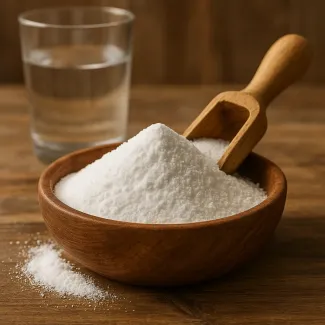
Unlocking the Power of Creatine: Daily Strategies to Boost Strength and Mental Clarity
How consistent creatine use enhances your physical performance, cognitive focus, and overall recovery
Creatine monohydrate is no longer just the secret weapon of bodybuilders and elite athletes. In recent years, it has moved into the spotlight as a powerful daily supplement for anyone looking to boost their physical strength, mental sharpness, and recovery capacity—regardless of age, gender, or fitness level. What makes creatine monohydrate particularly compelling is its simplicity, scientific backing, and wide-ranging benefits that go far beyond muscle gain.
Unlike supplements that rely on synthetic stimulants or obscure ingredients, creatine is a naturally occurring compound, already present in our muscles and brain. The reason to supplement it is simple: our body’s natural reserves are limited, and the modern lifestyle doesn’t always support replenishing them. That's where a consistent intake of 3–5 grams per day becomes a game-changer, not just for athletes, but for anyone seeking improved energy levels, memory function, and resilience.
What is creatine monohydrate and why it matters for everyday health
Creatine is a compound that your body makes from amino acids and stores primarily in your muscles. However, a small portion is also found in the brain, where it's involved in cellular energy production. The monohydrate form is the most extensively studied and widely used, offering excellent bioavailability, stability, and cost-effectiveness.
Supplementing with creatine monohydrate allows your muscles and brain to regenerate ATP faster, which is the fundamental energy currency in the body. Whether you’re lifting weights, working through a stressful day, or pushing your limits in a long run, extra ATP translates into more strength, better endurance, and faster recovery.
When used consistently at a low daily dose, creatine doesn’t just enhance performance during training sessions—it also has a cumulative effect on your energy metabolism, helping reduce fatigue and improve focus over time.
How creatine supports both strength and cognitive performance
Creatine is best known for its ability to increase muscular power and lean mass, but its benefits go deeper than the gym. The same mechanisms that fuel explosive movement also support brain function. By increasing energy availability in brain cells, creatine can improve mental clarity, reaction speed, memory retention, and even emotional stability.
In clinical observations, low creatine levels have been linked to brain fog, fatigue, and difficulty concentrating, especially during high-stress situations or in people with restricted diets such as vegetarians or vegans. Regular supplementation helps maintain steady energy for mental tasks, especially those requiring sustained attention or multitasking.
Understanding the optimal daily dosage: simplicity is key
The beauty of creatine lies in its straightforward dosage protocol. You don’t need complex cycles, risky stacking, or expensive variants. A simple daily dose of 3–5 grams of creatine monohydrate is sufficient for nearly all adults.
For those just starting out, some choose to follow a “loading phase” (20 grams per day for 5–7 days split into multiple doses), but this is entirely optional. The standard protocol of 3–5 grams per day reaches the same saturation level in muscle and brain within a few weeks—without potential gastrointestinal discomfort associated with loading.
You can mix your creatine in water, juice, or even add it to a smoothie. Since it's flavorless and stable, it won’t affect the taste or texture. Consistency is more important than timing, although taking it around training or meals may slightly enhance absorption.
Creatine and recovery: more than just post-workout repair
Creatine does more than fuel your muscles; it helps them recover faster and more completely. After intense exercise, your muscles are depleted, inflamed, and in need of cellular repair. Creatine helps by increasing cellular hydration and ATP regeneration, both of which accelerate the recovery process.
This means less muscle soreness, reduced downtime between workouts, and improved long-term progress. But what many people don’t realize is that creatine’s recovery benefits also apply to the brain. After mental strain—such as long working hours or emotionally intense periods—creatine helps replenish depleted energy stores, restoring mental balance more efficiently.
Who benefits most from creatine: age, gender, and lifestyle considerations
Although often marketed to young male athletes, creatine is universally beneficial. In fact, certain groups may gain even greater benefits due to lifestyle or physiological needs.
- Women often report enhanced muscle tone and mental clarity, especially during hormonal fluctuations. Creatine can be a valuable ally for energy stabilization and mood support.
- Adults over 40 benefit from creatine’s role in muscle preservation, cognitive health, and bone support. It's a tool for aging gracefully while staying active.
- Vegetarians and vegans, whose diets are typically low in creatine, often experience significant improvements in energy and mental performance once supplementation begins.
- Busy professionals, students, and shift workers may notice a marked reduction in mental fatigue and better concentration under stress.
Timing your intake: should you take creatine before or after your workout?
There’s ongoing debate about the perfect timing for creatine supplementation. While studies suggest minimal difference in overall results, many people find post-workout creatine intake to be most convenient and effective, particularly when combined with carbohydrates or protein, which may improve cellular uptake.
That said, the most important factor remains consistency. Whether you take it before breakfast, after lunch, or with your evening smoothie, daily usage ensures that your muscles and brain maintain a steady supply of phosphocreatine, the high-energy molecule stored in your cells.
Debunking the common myths about creatine usage
Despite decades of research, creatine is still surrounded by misconceptions. Some worry about water retention, kidney strain, or weight gain, but these concerns are largely unfounded when using normal dosages in healthy individuals.
- Water retention is usually limited to intracellular water, which supports muscle fullness and doesn’t lead to bloating.
- Kidney concerns are based on outdated misunderstandings. For people with no pre-existing kidney issues, creatine at recommended doses is safe for long-term use.
- Weight gain from creatine is typically from increased lean muscle and cellular hydration, not fat accumulation.
Creatine is not a steroid, nor is it hormonally active. It’s one of the most well-researched, natural, and effective supplements available.
Creatine and hydration: why water intake matters more than you think
One overlooked aspect of creatine usage is its impact on hydration. Creatine helps draw water into your muscle cells, which is beneficial for cell volume, nutrient transport, and recovery. However, this also means your daily water intake should be slightly increased—not excessively, but consistently.
Aim for at least 2.5 to 3 liters per day, especially during the first few weeks of use. Proper hydration ensures that creatine can function optimally and support your body’s thermoregulation during exercise and heat exposure.
Creatine and endurance: performance benefits beyond strength training
While creatine is commonly associated with resistance training, it also provides significant benefits for endurance athletes. Runners, cyclists, swimmers, and even yoga enthusiasts report improved stamina, faster recovery, and better energy management when using creatine daily.
This is especially valuable during interval training, long-distance events, or high-rep workouts, where cellular energy is repeatedly depleted and replenished. Creatine helps sustain peak effort over time, reducing fatigue and improving training quality.
Daily creatine and mood: the mind-muscle connection
Emerging evidence suggests that creatine has positive effects on mood, mental resilience, and even symptoms of low motivation or mild depression. These benefits are likely tied to improved brain energy metabolism, particularly in areas of the brain responsible for emotion and decision-making.
People who supplement consistently often describe a greater sense of drive, emotional clarity, and reduced burnout. While creatine isn’t a replacement for mental health treatments, it appears to be a supportive tool for mental balance and productivity.
The long-term impact of consistent creatine supplementation
Most supplements are designed for short bursts of use, but creatine stands out as a long-term ally. Its benefits are cumulative, and consistent usage leads to progressively improved physical and mental outcomes over months and years.
Unlike caffeine or pre-workout stimulants that create a cycle of ups and downs, creatine builds your baseline capacity. Users often report that the most noticeable improvements appear after 6–12 weeks, and continue to increase with regular training and balanced nutrition.
For those committed to lifelong health, creatine offers a rare combination: simple dosage, universal benefits, and measurable progress. Whether you’re building strength, sharpening focus, recovering from fatigue, or just trying to feel your best each day, creatine monohydrate may be one of the smartest daily habits you can adopt.




